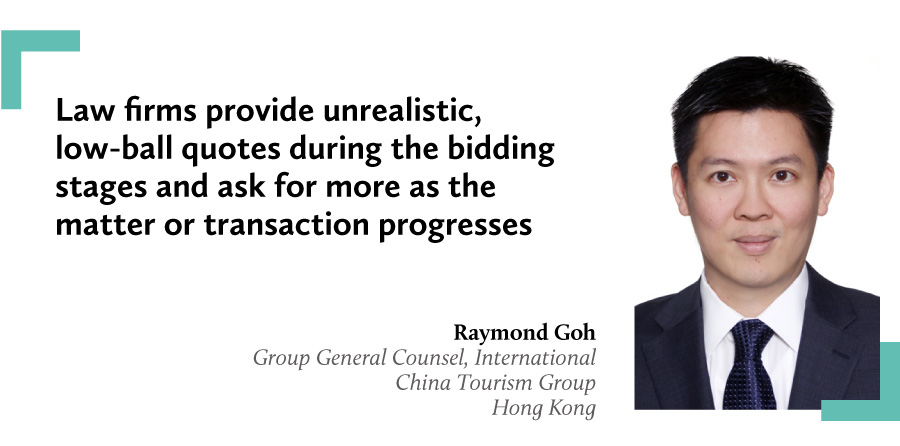Do you really want to find out? Our sister publication Asia Business Law Journal’s survey gets the real opinions of regional in-house counsel when it comes to legal services from law firms, and they’re not pulling any punches. Putro Harnowo reports
H
aving law firms on your side is a must in today’s business climate. But sometimes in-house counsel feel the relationship is one-sided, the fee structure is lopsided, and their company’s needs have been outsided.
To get the real picture, Asia Business Law Journal conducted a survey of in-house counsel in the region to hear their complaints and expectations. The survey found that not all is well. The majority of in-house counsel surveyed expressed the importance of a harmonious relationship with their law firm counterparts, but most of them have a negative view of traditional pricing practices.
“Understanding our business, what matters to us, and providing us with insights and advice from people with genuine domain expertise, who can ideally point out risks or opportunities that we may not have otherwise fully appreciated, is a great way to add value,” says Christopher Betts, general counsel at Grab in Singapore.
“Some law firms try to be everything to a client, which can result in inconsistent quality. The better firms figure out what they are really good at and focus on doing an outstanding job in those areas,” says Betts. “I also appreciate firms that are prepared to actively work with us to find ways to manage our legal costs effectively.”
For Chae Jooyup, general counsel and vice president of SK Biopharmaceuticals in Seoul, communication is vital when dealing with external counsel. “Law firms need to provide more strategic and practical solutions by having a more integrated understanding of the real interest of the clients through intensive and robust communication and fact-finding efforts,” says Chae.
Jolly Abraham, director of legal at private equity company True North in Mumbai, suggests that law firms “price their output and deliverables that add value to our business, rather than their time to deliver the output”.
“Law firms can adopt smart legal tech to ensure that lawyers are doing high-value legal work,” says Abraham. “They shouldn’t be billing us for the time taken by lawyers to do things that a machine can do much more efficiently.”
Pricing issue and poor service
Among 108 respondents to our survey, 55 cited pricing issues and poor quality as their top complaints. Other issues include slow turnaround time and poor communication, as expressed by 51 and 43 respondents, respectively. Most in-house counsel submitted at least two complaints in the survey.
“Law firms provide unrealistic, low-ball quotes during the bidding stages and ask for more as the matter or transaction progresses,” says Raymond Goh, group general counsel, international at China Tourism Group in Hong Kong.
“A particular Magic Circle law firm has gained a bad reputation for such practices in recent years, and we have blacklisted all firms that engage in similar practices,” says Goh. “The quality of the law firms in Hong Kong, even Magic Circle and Wall Street law firms, and their lawyers, even junior partners, have gone down dramatically over the years. I’d be willing to pay more for better service quality and pragmatic advice.”
Roger Chae, general counsel, global legal and compliance at automotive air conditioning producer Hanon Systems in Seoul, has a similar observation. “There is a feeling that the matter is being dragged out, or made complicated, to get more fees,” he says. “Law firms should not only identify issues but think holistically and suggest practical and commercially viable solutions. Take a position, not ‘maybe, 50/50’.”
Advice that’s too academic and impractical is a bone of contention for Kezia Pembayun, legal director at L’Oreal Indonesia in Jakarta. “This usually happens because the lawyers do not understand the clients’ business, or the market or industry where the clients are operating,” says Pembayun.
“Nowadays, companies have their in-house counsel, and will only look to external lawyers to get independent advice, or expertise in understanding specific topics, with the expectation to have more visibility to options and solutions,” says Pembayun. “However, in some cases, the external lawyers fail to include market practices, government appetite or directions, etc. Their views sometimes are rigid and strict readings.”
Erika Evasdottir, managing director at consultancy firm Centrium Advisory in Hong Kong, gets upset when law firms are unresponsive. “If we email you [law firms], respond immediately and set a timeframe for response, and then meet that timeframe,” she says. “Even if the timeframe is two weeks from now, it still gives us comfort you are doing something. Too many go silent, leaving us to be wondering, ‘did you receive the email?’”
Derek Chin, general counsel at Malaysian conglomerate Berjaya Corporation in Kuala Lumpur, demands more specialised advice and a more reasonable fee structure, especially for dispute resolution on a contingency basis. “Often in dispute resolution, whether with arbitration or the court process, it can be a very tedious, slow and costly process, especially in certain foreign jurisdictions where the legal system is less well developed,” says Chin.
In Bangkok, a similar issue is expressed by Supagorn Jittimaporn, vice president of legal and compliance at real estate developer Boutique Corporation. “Law firms can add more value with new pricing options, rather than classic capped fees,” he says. “It is hard to track legal bills in litigation matters.”
Time is not money
Talking more about the pricing issue, more than half of the in-house counsel surveyed opted for project-based billing – based on the complexity level – than the traditional pay per hour, which only 6% of respondents chose. The second-most-popular option is a flat rate, where the total legal fee is fixed for some defined legal task.
You must be a
subscribersubscribersubscribersubscriber
to read this content, please
subscribesubscribesubscribesubscribe
today.
For group subscribers, please click here to access.
Interested in group subscription? Please contact us.
你需要登录去解锁本文内容。欢迎注册账号。如果想阅读月刊所有文章,欢迎成为我们的订阅会员成为我们的订阅会员。
Nominations were made by professionals in leading companies in the region including: Agricultural Bank of China, AirTrunk, American Express India, AUO, Auras Technology, Bank CIMB Niaga, Julius Baer, Baramulti Group, Berjaya Corporation Group, BOCOM International Holdings, Bosch, Boutique Corporation, Budweiser, BW Group, Centrium Advisory, China National Aviation Fuel Logistics, China National Oil and Gas Exploration and Development Company, China Orient Asset Management, China Renaissance, China Resources Enterprise, China Tourism Group Corporation Limited, CIT Group, CRRC Zhuzhou Locomotive, CureFit, Dassault Systemes, Essar Capital, Fullerton Healthcare, GapSat, Global Business Power Corporation, Grab, GSK, Hanon Systems, Hyundai Motors, ICICI Securities Primary Dealership, Indonesia Financial Group, Infosys, Jaldhi Overseas, Juniper Networks, KE Holdings, Khaleeji Commercial Bank, KM Dastur, LexinFintech Holdings, LG Electronics India, L’Oreal Indonesia, Lotte International, Mindtree, Ming Yuan Cloud Group Holdings, Nippon Steel Corporation, Oerlikon, Optum Global Solutions, Pacific & Orient Insurance, Perfect World, Philex Mining Corporation, Rohan Rajdeep Tollways, Saint-Gobain, Schaeffler India, Shaanxi Investment Group, Shanghai Zhihe Network Technology, SK Biopharmaceuticals, Sporta Technologies, TCL Capital, Temasek International, Terumo Corporation, the Export Import Bank of China, The Great Eastern Life, Thome Ship Management, Toridoll Holdings, True North, TV Today Network, Tysan Holdings, MP Healthcare, Woolworths, Yum China Holdings, and many more.






















